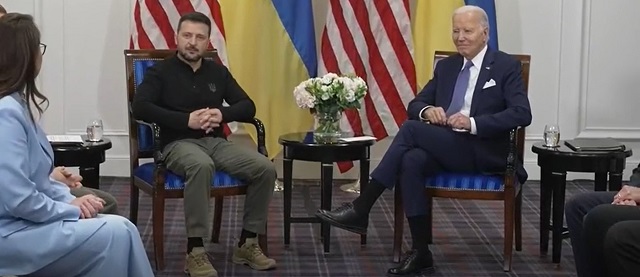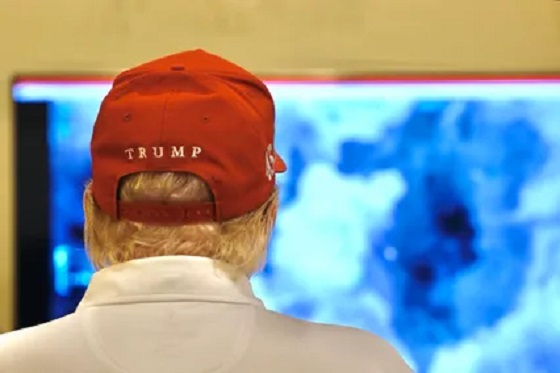conflict
Europeans Aren’t Concerned About Russian Bear Invading Continent After Ukraine

 From the Daily Caller News Foundation
From the Daily Caller News Foundation
The foreign policy blob in Washington, D.C., would have us believe that Vladimir Putin is Adolf Hitler 2.0 and must be stopped before he rolls over the rest of Europe. It is an intellectually lazy argument.
In the first place, Russia has struggled in its fight with Ukraine—a small nation with one-fourth Russia’s population and far fewer resources. How would Mother Russia fare against the combined firepower of NATO? Likely not so hot: Europe’s economy is six times larger than Russia’s. Likewise, the population advantage of Europe stands three-to-one over Russia.
Aside from Russia’s vast nuclear weapons stockpiles, it is no match for Europe.
Putin knows he would be crushed in a head-to-head with NATO and has repeatedly made clear that he has no interest in going to war with any NATO country, including Poland.
Secondly, if Europe was seriously under threat from the Russian bear, you might think that Europeans themselves would be more alarmed. They don’t seem to be. In fact, across nearly every threat measured by the Munich Security Council, trends show a downward ebb among Europeans. To most, Russia ranks as a threat below radical Islamic terrorism and mass migration. The Germans are more worried about cyber attacks than Putin; to the French, racism is more worrisome.
Aren’t these the very people America is spending $185 billion in Ukraine to protect from Russian expansionism?
Across the European continent, the United States maintains 100,000 troops on 185 major military bases and 78 minor sites (minor being defined as less than 10 acres or $10 million). Taken altogether, American forward operating bases in Europe sprawl over 265,000 acres with an estimated value of $95.5 billion. When one examines the Department of Defense’s annual budget, protecting Europe is America’s largest yearly expenditure—and that’s before Ukraine supplemental funding is added to the tally.
Yet the average resident of Berlin is likely more worried about his email getting hacked than he frets about the Kremlin rolling tanks through Deutschland.
Europe was the world’s center for combat power from roughly 1400 until 1945. No more. Even the larger armies of NATO are struggling to maintain effective combat power. The British Army cannot sustain a complete expeditionary armored brigade. At 23 years old, the Charles de Gaulle, France’s flagship and sole aircraft carrier, is reaching the end of its effective lifespan but sea trials are not expected to begin for its replacement until 2036.
The French have less than 90 heavy artillery pieces—Russia is losing more each month fighting Ukraine. Reporting in October 2022 found that Germany only had enough ammunition for two days of war, far below the NATO 30-day minimum. In 2022 NATO exercises, none of the Bundeswehr’s 18 new Puma infantry fighting vehicles were able to complete the drill.
Ukraine has revealed many of NATO’s weakness. These led a professor of war studies at the University of Warwick, Anthony King, to remark that Europe has “systematically demilitarized itself because it didn’t need to spend the money. They have basically gone to sleep.”
That ambivalence toward defense comes across in another recent survey of Europeans. Sixty percent of Italians, 47% of Germans and 40% of the French are in favor of cutting off arms shipments to Ukraine. Across Europe, 60% think that Ukraine will be an economic burden. Among the French, Spanish and Italians, more than 40% either don’t know or don’t care who wins the war in Ukraine.
Perhaps America’s security blanket for Europe has been too heavy and we have indeed lulled the continent into a stupor. Or maybe Europeans are correct in their assessment of Putin—that his invasion of Ukraine is not a precursor to the reassembly of the U.S.S.R.
In either case, more American taxpayers are questioning the D.C. logic that demands ever-increasing blank checks for a war with no end in sight.
Morgan Murphy is a former DoD press secretary, national security adviser in the U.S. Senate, a veteran of Afghanistan.
The views and opinions expressed in this commentary are those of the author and do not reflect the official position of the Daily Caller News Foundation.
Featured image credit: (Screen Capture/CSPAN)
conflict
Zelensky Alleges Chinese Nationals Fighting for Russia, Calls for Global Response

 Sam Cooper
Sam Cooper
Ukrainian President Volodymyr Zelensky announced Tuesday that his forces have captured two Chinese citizens fighting as part of the Russian army in eastern Ukraine, alleging “there are many more Chinese citizens in the occupier’s units.” The stunning revelation could inject a volatile new dimension into ceasefire negotiations between the United States and Russia—and intensify already fraught tensions over Taiwan.
Zelensky shared the news in an X post, accompanied by video of one of the captured men—an Asian male in beige fatigues, hands bound with zip ties, visibly distressed as he gestures to a Ukrainian camera operator. The video shows the man making whirring sounds, crouching instinctively as if a drone is circling above and opening fire—then glancing up and uttering the English word, “commander.”
“We have information suggesting that there are many more Chinese citizens in the occupier’s units than just these two,” Zelensky wrote on X. “We are currently verifying all the facts—intelligence, the Security Service of Ukraine, and the relevant units of the Armed Forces are working on it.”
The president said he has instructed Ukraine’s foreign minister to urgently contact Beijing to clarify how China intends to respond.
“Russia’s involvement of China, along with other countries, whether directly or indirectly, in this war in Europe is a clear signal that Putin intends to do anything but end the war,” Zelensky wrote. “He is looking for ways to continue fighting. This definitely requires a response. A response from the United States, Europe, and all those around the world who want peace.”
Zelensky added that Ukrainian authorities had recovered documents, bank cards, and personal data from the two prisoners—material that could be pivotal in discovering the nature of China’s involvement.
If verified, the presence of Chinese nationals fighting for Russia could carry sweeping geopolitical implications. It would complicate delicate U.S.-Russia negotiations aimed at exploring a conditional ceasefire, and could have indirect ramifications on the plans of Washington, Tokyo, and Taipei in their growing confrontation with Beijing.
China has repeatedly denied providing direct military support to Russia. Zelensky’s statement marks the first time Ukraine has publicly alleged that Chinese nationals are embedded in Russian combat units—an allegation that, if substantiated, could alter the strategic calculus in both Eastern Europe and the Indo-Pacific.
Responding to Zelensky’s claims, Tom Shugart, a senior defense analyst at the Center for a New American Security and a former U.S. Navy officer, emphasized that the strategic implications hinge on whether the Chinese nationals were acting as mercenaries or state-directed personnel. “If the PRC is actively providing soldiers to fight in Ukraine, that would be altogether different—a possible sign of a real Axis that may best be resisted wherever it is fighting,” he wrote on X.
This is a developing story. The Bureau will continue to report as further details emerge.

Recommend The Bureau to your readers
conflict
“HELL WILL RAIN DOWN”: Trump unleashes U.S. military on Yemeni Houthis

 MxM News
MxM News
Quick Hit:
President Trump ordered a massive military assault on Iranian-backed Houthi forces in Yemen on Saturday, vowing to unleash “overwhelming lethal force” after months of attacks on American and allied vessels in the Red Sea.
Key Details:
-
Trump announced the strikes in a Truth Social post, stating, “Today, I have ordered the United States Military to launch decisive and powerful Military action against the Houthi terrorists in Yemen.”
-
He criticized former President Joe Biden for failing to contain the Houthis, saying his response was “pathetically weak” and emboldened the group’s ongoing attacks on commercial and military vessels.
-
The U.S. Navy’s USS Harry S. Truman carrier strike group, along with three destroyers and a cruiser, launched the assault, targeting radars, air defenses, and missile systems used to disrupt shipping lanes.
CENTCOM Forces Launch Large Scale Operation Against Iran-Backed Houthis in Yemen
On March 15, U.S. Central Command initiated a series of operations consisting of precision strikes against Iran-backed Houthi targets across Yemen to defend American interests, deter enemies, and… pic.twitter.com/u5yx8WneoG
— U.S. Central Command (@CENTCOM) March 15, 2025
Diving Deeper:
President Trump escalated U.S. military action against Iran-backed Houthi rebels on Saturday, ordering airstrikes on targets in Yemen in response to the group’s repeated attacks on Red Sea shipping. Trump, in a Truth Social post, declared that the U.S. military would not tolerate continued aggression and vowed an overwhelming response.
“The Houthi attack on American vessels will not be tolerated,” Trump wrote. “We will use overwhelming lethal force until we have achieved our objective.” He directly warned the Houthis, stating, “YOUR TIME IS UP, AND YOUR ATTACKS MUST STOP, STARTING TODAY. IF THEY DON’T, HELL WILL RAIN DOWN UPON YOU LIKE NOTHING YOU HAVE EVER SEEN BEFORE!”
The strikes, carried out by U.S. Central Command, targeted missile sites, drone launch facilities, and command centers used by the Houthis to strike commercial and military vessels in the Red Sea. U.S. warships and carrier-based fighter jets participated in the mission, marking a significant escalation in efforts to protect international shipping routes.
Trump also issued a direct warning to Iran, demanding that its support for the Houthis “must end immediately.” Addressing Tehran, Trump wrote, “Do NOT threaten the American People, their President…or Worldwide shipping lanes. If you do, BEWARE, because America will hold you fully accountable and we won’t be nice about it!”
The strikes come after more than a year of escalating attacks by the Houthis, who have targeted over 100 merchant vessels, sunk at least two, and killed multiple sailors since the Israel-Hamas war began. Trump pointed to Biden’s failures in handling the crisis, noting that “it has been over a year since a U.S.-flagged commercial ship safely sailed through the Suez Canal, the Red Sea, or the Gulf of Aden.”
With Trump’s order, the U.S. is making clear that hostile actions in the Red Sea will not go unanswered. As military operations continue, all eyes will be on whether the Houthis and their Iranian backers heed the warning—or face even greater firepower from the U.S. military.
-

 2025 Federal Election1 day ago
2025 Federal Election1 day agoOttawa Confirms China interfering with 2025 federal election: Beijing Seeks to Block Joe Tay’s Election
-

 International2 days ago
International2 days agoPope Francis Dies on Day after Easter
-

 International2 days ago
International2 days agoJD Vance was one of the last people to meet Pope Francis
-

 COVID-191 day ago
COVID-191 day agoNearly Half of “COVID-19 Deaths” Were Not Due to COVID-19 – Scientific Reports Journal
-

 2025 Federal Election1 day ago
2025 Federal Election1 day agoHow Canada’s Mainstream Media Lost the Public Trust
-

 2025 Federal Election23 hours ago
2025 Federal Election23 hours agoBREAKING: THE FEDERAL BRIEF THAT SHOULD SINK CARNEY
-

 2025 Federal Election1 day ago
2025 Federal Election1 day agoReal Homes vs. Modular Shoeboxes: The Housing Battle Between Poilievre and Carney
-

 International13 hours ago
International13 hours agoNew York Times publishes chilling new justification for assisted suicide







